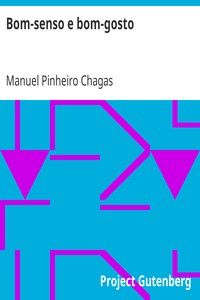| Author |
Chagas, Manuel Pinheiro, 1842-1895 |
| Title |
Bom-senso e bom-gosto
Folhetim a proposito da carta que o senhor Anthero do Quental dirigiu ao senhor Antonio Feliciano de Castilho
|
| Credits |
Produced by Pedro Saborano
|
| Summary |
"BOM-SENSO E BOM-GOSTO" by Manuel Pinheiro Chagas is a literary folhetim written in the mid-19th century. This work notably addresses a public letter by Anthero do Quental to Antonio Feliciano de Castilho, discussing a critical dispute regarding the literary styles of the time, specifically targeting the Coimbra School of poetry. The author employs sharp wit and sarcasm to critique both the artistic ideals and the style of contemporary poets, highlighting issues of originality and authenticity in literature. In the text, Pinheiro Chagas examines Quental’s defense of his ideals against criticism, dissecting various aspects of Coimbra's literary contributions and their perceived pretentiousness. He paints a vivid picture of the poetic landscape, illustrating a divide between poets who adhere to traditional forms versus those who innovate without substance. The narrative reflects a broader commentary on the conflict between romanticism and realism in Portuguese literature, while also emphasizing the need for genuine expression over affectation. Ultimately, the work stands as a defense of literary clarity and sincerity, celebrating authors who advocate for a more accessible and impactful form of poetry. (This is an automatically generated summary.)
|
| Language |
Portuguese |
| LoC Class |
PQ: Language and Literatures: Romance literatures: French, Italian, Spanish, Portuguese
|
| Subject |
Portuguese literature -- 19th century -- History and criticism
|
| Subject |
Quental, Antero de, 1842-1891
|
| Category |
Text |
| EBook-No. |
30069 |
| Release Date |
Sep 23, 2009 |
| Most Recently Updated |
Jan 5, 2021 |
| Copyright Status |
Public domain in the USA. |
| Downloads |
74 downloads in the last 30 days. |
|
Project Gutenberg eBooks are always free!
|

